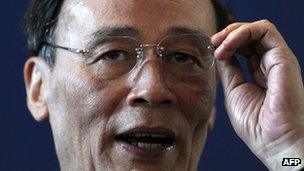China faces to watch: Wang Qishan
- Published
China is gearing up to change its top leaders, a process that begins at the end of the year. This week, the annual parliamentary session will give those in the running the chance to show off their credentials. The BBC's Michael Bristow profiles key figures.
Wang Qishan might not be a name known on the streets in the West - but he is certainly someone known to Western leaders.
For several years, he has been China's chief negotiator with the United States on economic affairs.
Henry Paulson, the former US treasury secretary, described him as "decisive and inquisitive", and someone with a "wicked sense of humour".
This suggests a level of intimacy not usually seen in relationships between Chinese leaders and their counterparts abroad.
Mr Paulson could not have been more impressed with Mr Wang's ability.
"[He] managed the largest bankruptcy restructuring in China's history in 1998 and thereby prevented a banking crisis that could have crippled the country's growth," he wrote in Time magazine.

A US official has described Mr Wang as "decisive and inquisitive"
Mr Wang's abilities stretch beyond the financial world. He will have gained credibility for steering the Beijing Olympics to success in 2008.
The 63-year-old also seems comfortable about dealing with the public abroad - not an insignificant talent in China, where politicians are often wary about contact even with their own citizens.
Mr Wang has written comment pieces for major Western newspapers. In the New York Times, he wrote that "trade liberalisation is the engine of economic growth".
Odd words perhaps for a man who is a senior member of a communist party, but ones that suggest he will continue to support China's opening up and reform if he is promoted even further.
He is already a vice-premier in the government and on the party's politburo - and many analysts are tipping him to go even higher in the leadership reshuffle later this year.